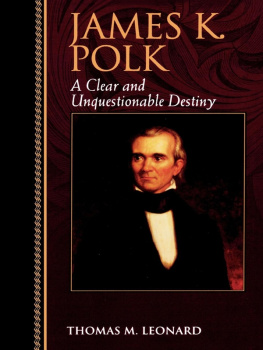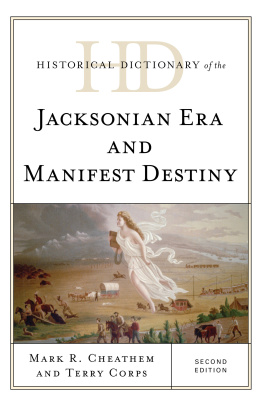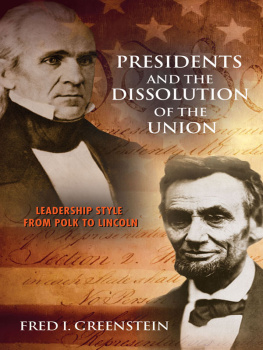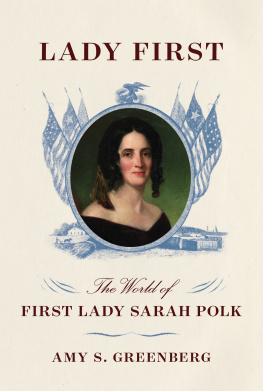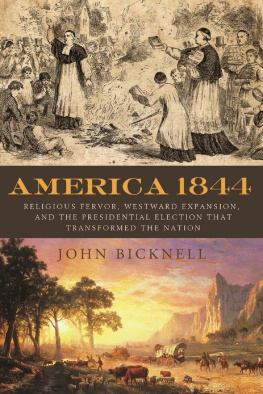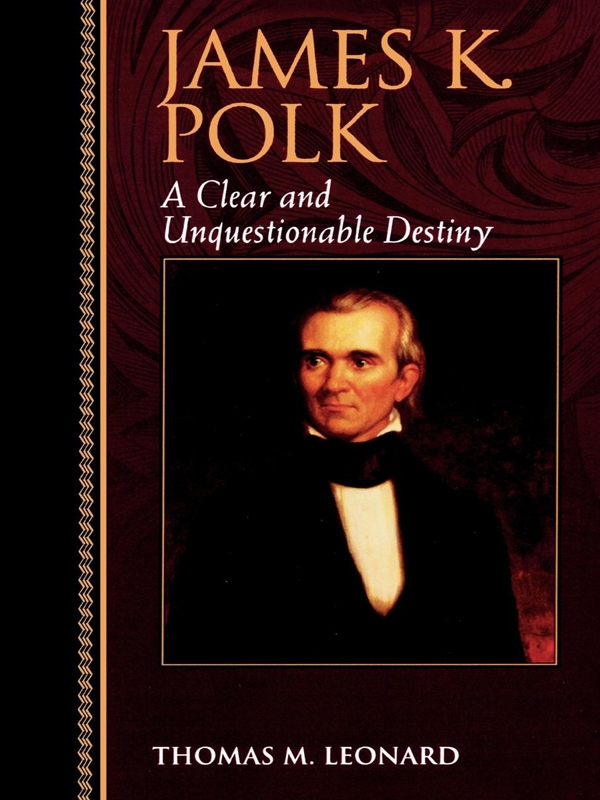Thomas M. Leonard is Distinguished Professor and Director of the International Studies Program at the University of North Florida. He has been a Fulbright Lecturer at Instituto Juan XXIII Argentina and the Institute for Advanced Studies in Mexico. His most recent publications are United States and Latin America, 18501903: Establishing a Relationship (2000) and Castro and the Cuban Revolution (1999). In addition to a Fulbright research grant, he received other research awards from the National Endowment for the Humanities, United States Department of Education, and the Andrew Mellon and Ford Foundations.
Bibliographical Essay
The literature regarding President James K. Polk and the events of his time is abundant; therefore, only the most salient works are cited here. To understand the controversies over Polks presidential capabilities and his responsibility for and conduct of the Mexican War, one should turn to James Van Horn, Trends in Historical Interpretation: James K. Polk, North Carolina Historical Review 42:4 (1965): 45464. Although this essay is in need of updating to reflect more recent literature, it provides a framework for understanding the Polk historiography.
Biographies are an excellent starting point for those wishing to gain an understanding of Polk and his period. The most recent, Sam W. Haynes, James K. Polk and the Expansionist Impulse (New York: Longmans, 1997), gives a favorable account of Polks political career with equal treatment allotted to various topics. The most complete study of Polks political career is Charles G. Sellers, James K. Polk: Jacksonian, 17951843 (Princeton: Princeton University Press, 1957), and James K. Polk: Continentalist, 18431846 (Princeton: Princeton University Press, 1966). Sellerss anticipated third volume would complete the study. Although dated, Eugene I. McCormac, James K. Polk: A Political Biography (Berkeley: University of California Press, 1922), is still useful. Two more recent volumes that focus upon Polks presidency are Charles A. McCoy, Polk, and the Presidency (Austin: University of Texas Press, 1960); and Paul H. Bergeron, The Presidency of James K. Polk (Lawrence: University of Kansas Press, 1987). The latter two studies are important for their emphasis on Polks domestic policies and administrative style. Two contemporary accounts are Lucien B. Chase, History of the Polk Administration (New York: George P. Putnam, 1850); and John S. Jenkins, James Knox Polk and a History of His Administration (Auburn, AL: James A. Alden, 1851). Both praise Polks accomplishments. Important for its information about the presidents family and administration is Anson and Fanny Nelson, Memorials of Sarah Childress Polk, Wife of the Eleventh President of the United States (New York: Anson D. Randolph and Company, 1892).
Primary source materials regarding Polks political career are abundant. His correspondence is available on microfilm at the Library of Congress in Washington, DC: Papers of James K. Polk, 67 reels. Eight volumes of these materials have been edited by Paul H. Bergeron et al., The Correspondence of James K. Polk (Nashville: Vanderbilt University Press, 19691993). For the fourteen years that Polk spent in Congress one should consult The House Journals, The Congressional Globe, and the Register of Debates; these same sources also are important for an examination of the events during the Polk presidency. The most important source for the presidency itself is Milo M. Quaife, ed., The Diary of James K. Polk, During His Presidency, 1845 to 1849, 4 vols. (Chicago: A. C. McClurg and Company, 1910), which gives Polks detailed account of events on a daily basis. Allan Nevins has edited a shorter version of the diary, which also includes an analytical introduction: Diary of a President (New York: Longmans, Green and Company, 1929). Volume four of James D. Richardson, comp., A Compilation of the Messages and Papers of the Presidents, 17891899 (Washington, DC: U.S. Congress, 1917), reproduces Polks public statements during his presidential term. These sources provide the framework for his political ideology.
While the first volume of the Charles Sellers biography, mentioned above, offers the best account of Polks early years on Tennessees frontier, other relevant discussions are found in Albert V. Goodpasture, The Boyhood of President Polk, Tennessee Historical Quarterly 7 (192122): 3850; Tennessee Historical Commission, Tennessee, Old and New, vol. 1 (Kingsport, TN: Kingsport Press, 1946); and Stanley J. Folmsbee, Robert E. Coslew, and Enoch C. Mitchell, History of Tennessee, vol. 1 (New York: Lewis Historical Publishing Company, 1960).
Other aspects of Polks life that are important for understanding the eleventh president include a discussion of his religious views, which are described by John B. McFerrin, A History of Methodism in Tennessee (Nashville: Southern Methodist Publishing House, 1869). John S. Bassett informs us about Polks plantations in The Southern Plantation Overseer, as Revealed in His Letters (New York: Negro Universities Press, 1968). Like other presidents of his time, Polk attempted to use the press to his own advantage. This concept is explored by Culver H. Smith in The Press, Politics, and Patronage: The American Governments Use of Newspapers, 17891875 (Athens: University of Georgia Press, 1977).
The place of the trans-Appalachian frontier in the larger context of Jeffersonian America can be found in Malcolm Rohrbough, The Trans-Appalachian Frontier: Peoples, Societies, and Institutions, 17751850 (New York: Oxford University Press, 1978); Drew McCoy, The Elusive Republic: Political Economy in Jeffersonian America (Chapel Hill: University of North Carolina Press, 1980); and Lance Banning, The Jeffersonian Persuasion: Evolution of Political Ideology (Ithaca: Cornell University Press, 1978).
An overview of the America in which Polk completed his political career is described by Glyndon G. Van Deusen, The Jacksonian Era, 18281848 (New York: Harper Brothers, 1959); Edward Pessen, Jacksonian America: Society, Personality, and Politics (Homewood, IL: Dorsey Press, rev. ed. 1978); and Arthur Schlesinger, Jr., The Age of Jackson (Boston: Little, Brown and Company, 1945). More recent interpretative studies include Charles G. Sellers, The Market Revolution: Jacksonian America, 18151846 (New York: Oxford University Press, 1991); and Harry L. Watson, Liberty and Power: The Politics of Jacksonian America (New York: Hill and Wang, 1990).
The economic differences that developed in the various sections of the United States from the 1820s through the 1840s are described in Stuart Bruchy, The Roots of American Economic Growth, 16071861 (New York: Harper and Row, 1965). Thomas Cochran provides an overview of industrial development in Frontiers of Change: Early Industrialism in America (New York: Oxford University Press, 1981). A portrait of the socioeconomic issues on the Midwestern frontier is found in Paul W. Gates, The Farmers Age: Agriculture, 18151860 (Armonk, NY: M. E. Sharpe, 1960). Gavin Wright thoroughly analyzes the economic development of the Old South in The Political Economy of the Cotton South: Households, Markets, and Wealth in the Nineteenth Century (New York: Norton, 1978). The standard picture of slavery from its defenders is presented by Ulrich B. Phillips, Life and Labor in the Old South (Boston: Little, Brown and Company, 1929). For a contrasting view see Robert Fogel and Stanley Engerman, Time on the Cross: The Economics of American Negro Slavery (Boston: Little, Brown and Company, 1976). The analysis of American society by Alexis de Tocqueville, translated from the French by Henry Reeves, Democracy in America (New Rochelle, NY: Arlington House, 1966), remains an important commentary on the United States during this time.

